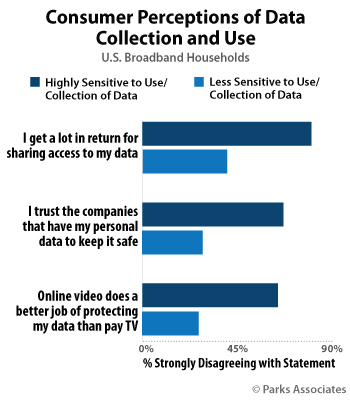One in five U.S. broadband households is highly sensitive to data collection and use
Wednesday, August 8th, 2018
Market research firm examines current and future impact of data on the pay-TV industry
New video research from Parks Associates today reveals that a particular segment of consumers, representing approximately 20% of U.S. broadband households, is highly sensitive to collection and use of information about themselves and their activities. While these consumers understand that many companies use this data, 80% believe that they receive little in return for use of their data. TV Services: Pay TV in a Data-Driven World focuses on the impact of big data on the pay-TV industry, both today and in the future.

“While traditional companies in the pay-TV marketplace use data in all of their decisions, new companies in the entertainment ecosystem such as Google take data use to the next level,” said Brett Sappington, Senior Director of Research, Parks Associates. “These companies were built in the age of big data, which allows them to iterate their services, software, user experiences, and content investment decisions much more quickly than traditional players. However, the traditional pay-TV players do have one notable advantage regarding the consumer – trust. One-third of U.S. broadband households feel that online video services are poor protectors of their data compared to pay-TV providers.”
The report recommends pay-TV providers and cable networks continue to gain data-oriented expertise and integrate data-centric features into their offerings that are transparent to consumers about data being gathered as well as incentives that come with that collection.
“The North American pay-TV market will experience a slow net decline in subscribers, falling from a market penetration of 79% in 2018 to 73% by the end of 2023,” Sappington said. “Cable and pay-TV companies see the challenges ahead and are exploring new ways of doing business in order to better perform, compete, and attract a new generation of customers.”
Additional data from the research reveals:
- 42% of U.S. broadband households would have greater confidence in sharing data if they could access a website or app that shows what data is being collected.
- Almost 40% of U.S. broadband households strongly believe that it is impossible to keep data private from companies whose products they use.
- Over one-half of consumers strongly believe that they do not get much in return for sharing their data.
Latest News
- Netflix posts first quarter 2024 results and outlook
- Graham Media Group selects Bitmovin Playback
- Dialog, Axiata Group, Bharti Airtel agree on merger in Sri Lanka
- Yahoo brings identity solutions to CTV
- Plex has largest FAST line-up with 1,112 channels
- TV3 migrates from on-prem servers to AWS Cloud with Redge